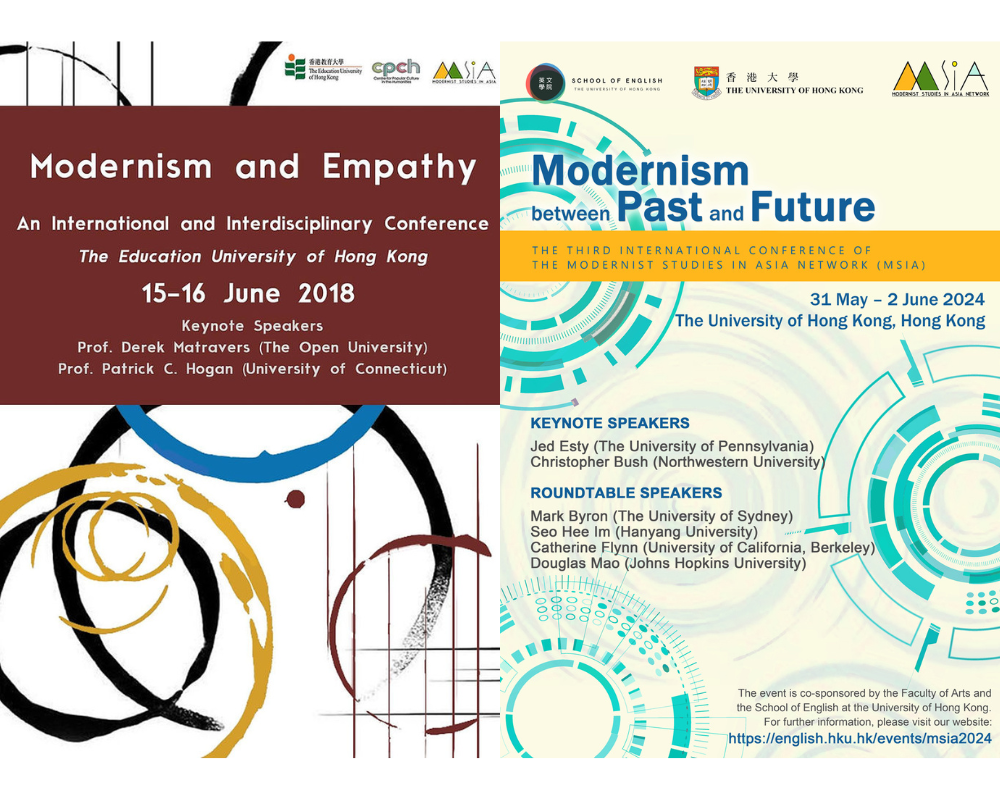The Third International Conference of MSIA: “Modernism between Past and Future”

By Jisu Bang
The Modernist Studies in Asia Network (MSIA) is currently organizing its third international conference at HKU, scheduled to take place from May 1 to June 2. The primary objective of this conference is to support and advance the study of modernism in Asia. MSIA aims to provide a platform for scholars from both within and beyond Asia to engage in discussions surrounding modernist cultures. By doing so, it addresses the need to facilitate academic exchanges on modernism for scholars in Asia who may face challenges in traveling abroad. Dr. Nan Zhang, a faculty member of our School and the Chairperson of MSIA, emphasizes the significance of engaging in intellectual dialogues in academic life.
The theme for this year’s conference is “Modernism between Past and Future.” While modernism is often viewed as a radical break from the past, MSIA encourages scholars to revisit this understanding and reposition “modern” within the continuum of past and future. This approach does not negate the experimental energy of modernism, which has historically served as a point of departure from the past. Rather, it invites more nuanced interpretations of modernism. Thinking in interdisciplinary terms, MSIA poses the question: How does modernism create a space where the past and future intersect, and where remembrance and anticipation are summoned to reconceptualize their significance? Further details about the conference can be found via this link.
The conference will feature two distinguished keynote speakers: Jed Esty from the University of Pennsylvania and Christopher Bush from Northwestern University. Jed Esty is a renowned modernist scholar known for his expertise in transatlantic literature. His extensive research encompasses a wide range of topics and employs an interdisciplinary approach that aligns with art of close reading. Christopher Bush is another esteemed modernist scholar with a background in comparative literature. His research focuses on transcultural and transnational comparative analysis, particularly with an emphasis on Asian cultures. The keynote addresses by these two exceptional speakers will undoubtedly contribute to the intellectual depth and diversity of the conference.
In addition to the keynote presentations, the conference will offer various events aimed at fostering academic discussion and networking opportunities. On the second day of the conference (June 1), a roundtable discussion will take place featuring Mark Byron from the University of Sydney, Seo Hee Im from Hanyang University, Catherine Flynn from the University of California, Berkeley, and Douglas Mao from Johns Hopkins University. The roundtable will center around the conference theme, “Modernism between Past and Future,” and will be moderated by Kendall Johnson, Head of the School of English at the University of Hong Kong. This discussion promises to offer diverse perspectives and insights on this theme. Furthermore, on the last day of the conference (June 2), there will be a “tram party” providing an extraordinary opportunity for participants and explore Hong Kong while riding on a tram. This will offer a more informal setting for participants to get to know each other better and engage in conversations outside the conference sessions.
The conference’s scale and diversity are fascinating aspects of the event. As an international conference, it brings together participants from various parts of the world, including the Australia, Hong Kong, Japan, Korea, Mainland China, Qatar, Singapore, the United Kingdom, and the United States. Furthermore, the participants represent a wide range of academic disciplines, including English Studies, Chinese Studies, Cultural Studies, Film Studies, History, Translation, Gender Studies, and more. With over 90 participants, this year’s conference is expected to offer plenty of scope for collaboration and academic exchange.
The conference’s diverse and extensive participation will provide a unique opportunity for scholars to connect and engage in interdisciplinary discussions about modernism in Asia. It will also reinforce MSIA’s role as a hub for modernist studies in Asia, bringing together scholars from different regions and academic backgrounds. Ultimately, the conference will serve as a powerful reminder of the importance and value of fostering collaboration and scholarly exchange.
